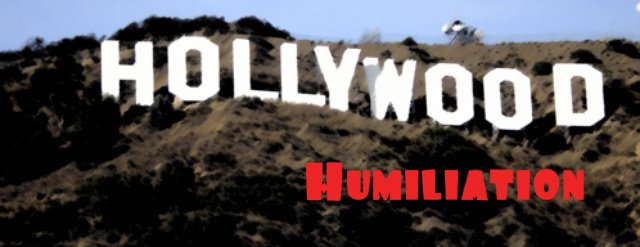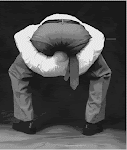Back in the late Cretaceous period, when I started this series of posts on anti-heroes, I had a few simple goals and expectations.
1. To come up with a clear and firm definition of what an anti-hero is.
2. To have no one agree on that definition, no matter how clear and firm I was.
3. To be called a moron (I even posted a picture of Forrest Gump).
4. To write about 10 of these anti-heroes.
5. To regret coming up with the idea after a while.
6. But still enjoy it.
7. Sort of.
But now that I have written nine of these things, it is time for the grand finale. The big tamale. The last hurrah. Time, indeed, for me to unleash my very best rhetorical wordisms in praise of that greatest of movie anti-heroes.
Anti-Hero #1: J.J. Sefton, from Stalag 17
Long time fans of the blog (and it really bears noting how strange that was to type) might remember that the penultimate entry on my "Movies about the Movies" series was also a Billy Wilder production, in that case Sunset Boulevard. Some of you might groan at the idea of my picking another Wilder movie/character as the top entry on a list, but according to a recent study by the New England Journal of Actual Scientific Things, people who dislike Billy Wilder movies are generally also found to rape their pets.
ANTI: It's midnight in a German prisoner of war camp, and two desperate men are about to attempt a blitz out. The other men gather nervously around. The barracks commander gives the two a few last terse instructions, makes them repeat the plan. And when there's nothing left to say they're suddenly gone, out through the floorboards and into an escape tunnel.
The men pace around. It's the longest night of the year, one says. I hope they make it to the Danube before dawn, says another. The murmurs swell. One prisoner, especially young looking, can't contain himself. "I bet they get all the way to Switzerland!" he blurts. The men all smile.
Except one. He frowns.
"And I bet they don't even get out of the forrest," he says.
They all look at him. "Now what kind of crack is that?" one says.
"No crack. Two packs of cigarettes say they never get out of the forest."
The men are appalled. Many call his bet. He'd make book on his mother getting hit by a truck, one of them says.
Outside, the two men reach the end of the tunnel and pop out on the other side of the wire. The coast seems clear and escape looks certain, but it isn't. They've been set up. A German machine gun nest is waiting for them, and as the two men stand to run one and then the other is mercilessly mowed down.
Inside the barracks, the men are horrified. Except one. He sighs and gathers the cigarettes. One moves to stop him.
"Hold it. So we heard some shots. Who says they didn't get away?" he says.
The man looks up. "Anybody here want to double their bet?"
Nobody does.
So begins the greatest prisoner of war movie ever made, Stalag 17 (yes, better than The Great Escape and Bridge on the River Kwai), and brings the calculating, amoral, selfishly opportunistic J.J. Sefton to the screen, in a performance that won William Holden the Academy Award.
Where most of the prisoners in Stalag 17 spend their time trying to escape or otherwise resist the Germans, Sefton doesn't bother. The only thing he cares about is making life easy for himself. He builds a telescope so the men can spy on a women's camp nearby. He builds a distillery. He builds a racetrack for mice and takes bets. For every service he charges cigarettes, which he turns into food, cigars and preferential treatment from the guards.
Not quite this preferential, but you get the idea.
Sefton snipes at everyone. The barracks chief. The two barracks clowns. No one is safe from his cynicism. One day two new men come into the barracks. Sefton recognizes one of them -- a Lieutenant Dunbar -- as being a rich kid from Boston. He and Sefton had gone into officer's training together, but Sefton was washed out, and now he taunts him mercilessly.
SEFTON: Look, Lieutenant. All your money won't help you here. Because here you're on your own. And no mother to throw you a lifeboat. Now let's see how good you can swim.
The lieutenant has managed to blow up a munitions train while being transported across Germany, and it doesn't take long after he tells his fellow prisoners about it that the Germans swoop in and lock him up. Between that, the two slaughtered escapees and a radio the Germans cheerfully confiscate, it seems inescapable -- there's a spy in the barracks.
No prizes for guessing who they accuse, pin to his bunk and then beat mercilessly.
Sadly, no.
HERO: Only Sefton isn't the informer. And lying in his bunk, bruised and bleeding, he resolves to figure out who it is.
Some watch Stalag 17 and see Sefton's pursuit of the real informer, which takes up most of the rest of the movie, as an act of selfish revenge and nothing more. But this interpretation ignores the deeper complexity of a character who's not just an amusingly cynical bastard, but in my view, a wounded idealist whose passion is finally aroused.
First he tries desperately to buy off a guard.
SEFTON: You better talk, Schultz, because I'm going to find out with you or without you. Because I won't let go for a second. Because they'll have to kill me to stop me! So talk!
Holden's performance here is truly inspired. Watch as his battered face burns with an anger it never showed during the first half of the movie.
But buying off the guard doesn't work, so he's forced to watch. To scheme. Finally, in a sequence that for my money ranks among the best ever filmed, Sefton lies in his bunk while the men sing "When Johnny Comes Marching Home Again" on a borrowed phonograph. The spy (I won't say who) watches the men from a distance, then goes over and uncovers a note the guards have hidden in the barracks. He reads the note and hides it before anyone knows, but Sefton sits up in time to catch the signal (a light cord) still swinging. He sits up and turns to look at it, and a flash of recognition goes through him. He's got it.
With that piece of puzzle, he bides his time until the signal is tripped again. This time he hides out in the bunk during a phony air raid and catches the spy in the act, explaining how the lieutenant blew up the train.
But now that he knows who it is, that doesn't mean it's over.
SEFTON: You tip your mitt and the Jerries pull him out of here and plant him someplace else, like Stalag sixteen or fifteen. Or you kill him off and the Krauts turn around and kill of the whole barracks. Every one of us. So what do you do?
Sefton bides his time. When the Gestapo shows up to take Lieutenant Dunbar away, the men stage an impromptu rescue and stash him in the camp. The spy offers to distract the guards, but Sefton smoothly interferes and prevents him from spoiling the plan. Dunbar is safely hidden, but only the barracks chief knows where. The Germans try desperately to find him, but without any inside information they're helpless to find him.
Finally it's time. Dunbar has to be moved. In another midnight meeting, the men draw dog tags to see who'll bust him out. But when the dog tag is drawn, the spy grabs it and makes the case it should be him.
With that, Sefton steps in. In a speech that would have been home in an episode of Columbo, he confronts the spy, shakes him up, reveals how the system works and gets him to crack. When the spy dives for the hole in the floor and cries out in German, the men restrain him.
Sefton's biggest enemy steps up to him. "Brother, were we all wet about you," he says. Sefton looks at him, grabs a cigar and strikes a match on his face.
"Forget it."
Sefton suggests a plan. He'll get Dunbar out of his hiding place, and when they're ready to go the men will throw the spy out of the barracks. The men in the goon towers are trained to shoot anyone out of the barracks after lights out, and the distraction should allow the two of them to escape.
Sefton grabs the clothes and the wire cutters. Every eye in the barracks is on him. When he gets down into the hole, he stops and addresses them.
"Just one more word," he says. "If I ever run into any of you bums on a street corner, just let's pretend we never met before."
According to Wilder, Sefton was his favorite of the characters in his movies -- the one he missed having around -- and it's not hard to see why. Sefton is smart, acerbic, funny and totally and unashamedly his own bastard self, just like Wilder. And he also suffers the indignity of being an outcast and the final vindication of proving everyone wrong, which is something we all, if we're lucky, have that fierce joy of feeling now and then.
I suppose it's obvious by now that I love the character of J.J. Sefton, too. He might be my favorite character in all the movies, for in that shock of being an outcast he rises to the challenge of being more than a self-obsessed heel.
He becomes a hero.
Note: The entirety of Stalag 17 can be watched on YouTube. It probably goes without saying that if you haven't seen it, stop what you are doing right this minute, even if what you're doing is pulling a knife out of your chest, and watch the movie.



















